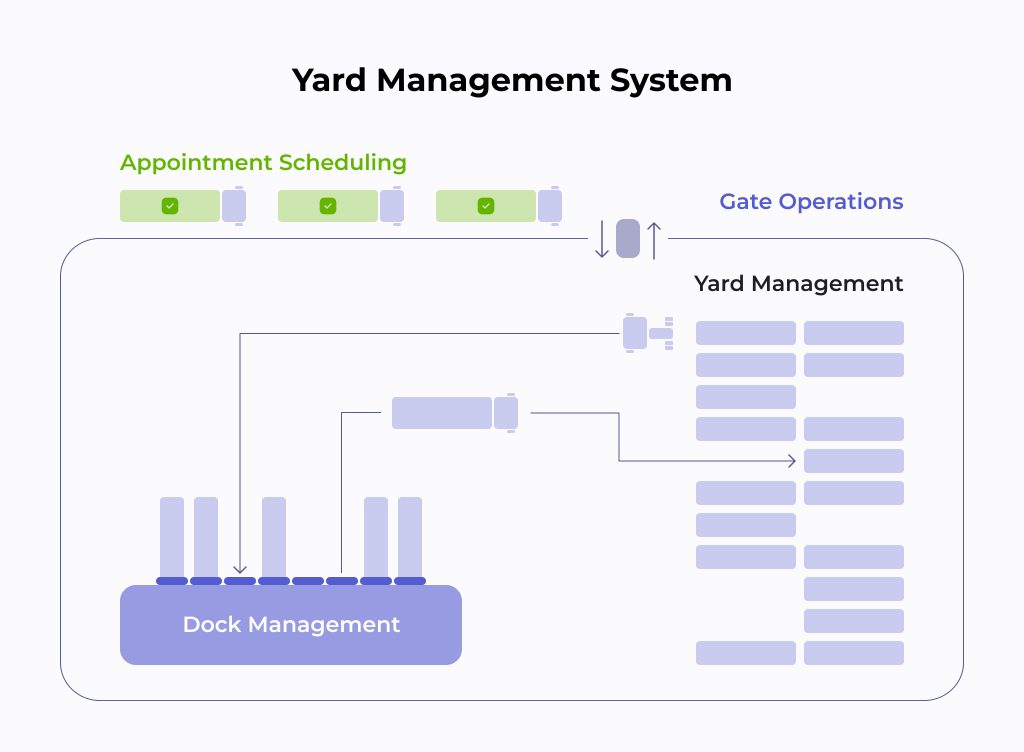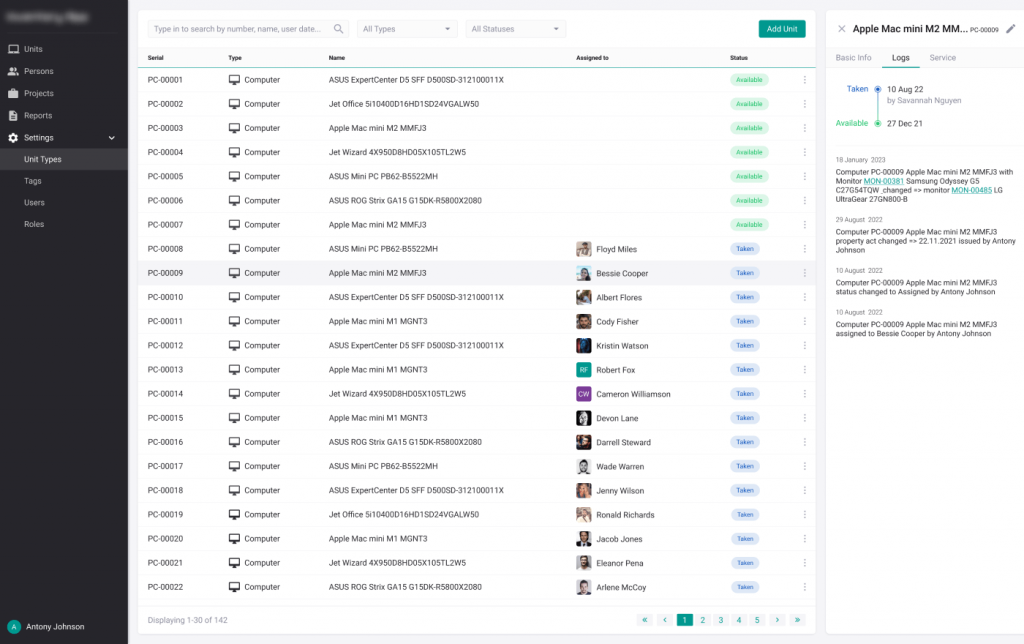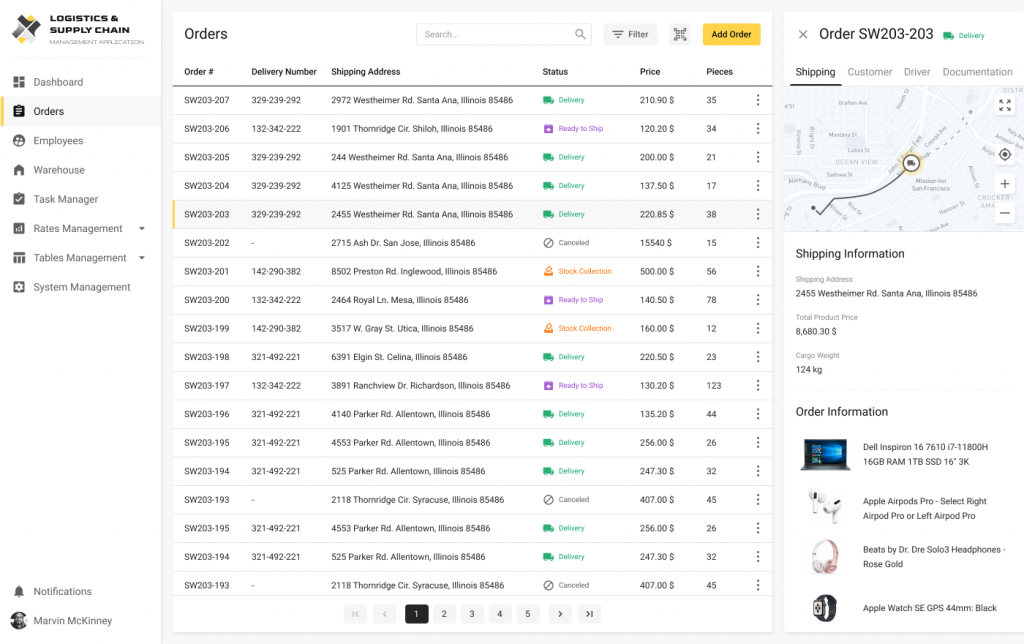For an outside observer, all operations involved in logistics and transportation are pretty straightforward. Bringing raw materials to the manufacturer and picking up what’s ready to be delivered to the customers looks like the easiest job ever. However, if we scale this up to the size of a small-medium company, the number of indicators to control will become too high to monitor efficiently.
Custom logistics solutions can help with specific challenges like building optimal delivery routes or monitoring the number of goods in stock. For better transparency and seamless data exchange, we often combine a set of applications serving a common purpose under one umbrella. You’ve probably heard of warehouse management systems that can be an excellent example of such solutions. Today, we’ll consider yard management systems that attract less attention but play an essential role in the work of logistics companies.
What’s a Yard Management System

Yard management itself is a critical part of the supply chain. It involves the optimization of a company’s yard and warehouse operations and includes a variety of activities. For example, it can be the management of trailers, containers, and other assets, scheduling and coordinating inbound and outbound shipments, and optimizing overall yard utilization and efficiency.
A yard management system, in its turn, helps employees to handle all these operations. It enables real-time visibility into yard activity and automates critical processes such as gate management or appointment scheduling. Thanks to the ability to track and manage inventory in real-time, a yard management system can help businesses to reduce inventory carrying costs, minimize lost or misplaced items, and improve inventory accuracy. Additionally, a yard management system can minimize detention and demurrage costs by enabling efficient scheduling of appointments and ensuring that trailers are loaded and unloaded quickly.
You can adopt one of two major types of yard management systems according to your needs. The first option is a full-fledged standalone solution. Here, we speak of a separate software system that can work independently from other apps your company relies on. If you deal with a custom development company, it can, for example, provide you with a mobile yard management application, including a limited set of features. It will help to improve the efficiency of your yard management team and increase their mmonitoobility without overpaying for what you don’t need.
Another option is yard management system integration. Suppose you already have a fully-functioning warehouse management system that has everything one may desire:

Unfortunately, there’s always a “but” that doesn’t let you sleep calmly at night. Lack of yard management functionality in your software, for example. If that’s your case, have no fear. You can expand the functionality of the system you already have by integrating additional modules into it. The question is what features must be added to guarantee the best outcome. Let’s find out.
Read also What Is a Smart Inventory Management System and How Is It Different from Ordinary Solution?
Must-have Features for a Yard Management System
Gate Management. This can help automate the check-in and check-out process for trailers, trucks, and vehicles entering or exiting the yard. The system should provide real-time information about the status of inbound and outbound shipments and any potential delays or issues. This feature should also allow for seamless communication between yard personnel and drivers, ensuring that all parties are informed of any updates or changes to the schedule.
Dock Control allows employees to assign and manage dock doors, ensuring that each one is being utilized effectively and that there is no confusion or overlap. The yard management system can enable real-time visibility into dock availability and allow for efficient scheduling of appointments and loading/unloading tasks.
Appointment Management. Inbound and outbound shipments can turn into a complete mess without due control. With an appointment management feature, you can schedule appointments which help ensure there is no bottleneck or delay in the yard.
Task Management. This one is essential for every software piece with the word “management” in its name, probably, with some exceptions. This critical component of a yard management system enables users to assign, track, and manage tasks related to yard operations. Creating customized task lists, delegating tasks to specific personnel, and monitoring their completion status help improve overall efficiency.
Real-Time Assets Monitoring. Trailers, containers, and tons of other equipment used in the yard require constant monitoring to stay in working condition. Real-time asset tracking capabilities help to locate and monitor their status in real time. Also, it can track the location of assets, as well as other information such as temperature and humidity.
Alert System. This part of yard management software is responsible for notifying users of any potential issues or exceptions that may arise in the yard operation. According to your needs, it can deliver alerts via email, text message, or other communication channels, allowing prompt action to resolve any issues.
Analytics and Reporting. You can’t efficiently plan your next steps without insights into yard performance, productivity, and efficiency. This feature should allow for customized reporting, enabling users to generate reports on key metrics such as yard utilization, throughput, and dwell times. These reports should also be exportable in various formats for further analysis or sharing.
All these features combined can form an ultimate management application for logistics making the transportation of goods as transparent as possible:

Business Benefits of Adopting Yard Management Software
In the previous chapter, we mentioned only the core features an average yard management system must provide access to. The very nature of custom software implies you can implement any functionality you want, which means the list may become even longer. Developing such software will cost you dearly, and you may wonder what you’ll get in return. Without further ado, let’s name a few benefits we believe you’ll like:
- Increased Efficiency. Yard management software provides real-time visibility into yard activity. It helps logistics companies to optimize yard utilization and reduce wait times;
- Improved Asset Tracking. Yard management apps can help logistics companies track the location and movement of trailers, containers, and other assets in real-time. It can reduce the risk of lost or misplaced items, improve inventory accuracy, and ultimately save time and money;
- Enhanced Security. Properly built software can help improve security by controlling access to the yard and monitoring activity in real time. As a result, you’ll see a reduced probability of theft, lowered risks of unauthorized access, and improved overall safety and security;
- Better Resource Planning. Valuable analytics and reporting capabilities that such software provides help analyze key performance metrics and identify areas for improvement. With this info in your possession, you can make data-driven decisions and achieve more advanced resource planning;
- Reduced Costs. By improving efficiency, reducing wait times, and optimizing yard utilization, yard management software can help reduce costs. It works in many ways, including cutting labor costs or minimizing detention and demurrage charges;
- Improved Customer Service. Tailor-made yard management software can also make your customers happy, which is vital for building strong long-term relationships. Reduced wait times and improved order accuracy will lead to increased customer satisfaction and improved customer loyalty.
Read also How Much Does It Cost to Develop an App and Which Methods Can Reduce Expenses?
Conclusions
Yard management software fills the gap between what happens in the warehouse and when the vehicle leaves for its destination to deliver certain items. Seemingly obvious tasks like gate operations or inbound/outbound shipment arrangements have a lot of potential for optimization. The appointment management system is not too hard to implement for an expert developer. Yet, the amount of time yard management software with such a feature can save you is significant. By adopting yard management software built considering many tiny aspects like these, you can reap the benefits you couldn’t even dream of.
Contact us if you want to adopt new yard management software or widen the functionality of the system you already have.